

Apple's War on Android. In her black robe and strand of white pearls, Lucy Koh projects the serious, deliberate demeanor befitting a U.S. District Court judge. The Harvard-educated former federal prosecutor has served on the California state bench and as a partner in a Silicon Valley law firm, where she litigated technology patent lawsuits. For all her earnestness, Koh, 43, could not resist needling the lawyers skirmishing before her at a hearing last June in San Jose. “Last time you were here,” the judge noted, “you said that you had a business relationship—I forget what the number was—$8 million, $8 billion?”
“I think it was in excess of $7 billion,” said attorney Harold McElhinny. Judge Lucy Koh “Seven billion,” Judge Koh mused. Nine months later, the case of Apple v. The clash reflects life in the tech big leagues: Apple sharply reminding a formidable rival who’s boss. In the last 18 months of his life, Jobs, who died on Oct. 5 at age 56, was obsessed with crushing Android. iPhone 5, un « non-événement » L’après 12 septembre !
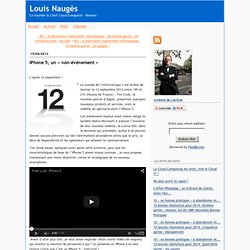
Le monde de l’informatique c’est arrêté de tourner le 12 septembre 2012 entre 19h et 21h (heures de France) ; Tim Cook, le nouveau patron d’Apple, présentait quelques nouveaux produits et services, mais la vedette du spectacle était l’iPhone 5. Cet événement majeur avait même obligé le tandem Nokia-Microsoft à avancer l’annonce de leur nouvelle vedette, le Lumia 920, dans la semaine qui précédait, quitte à ne pouvoir donner aucune précision sur des informations secondaires telles que le prix, la date de disponibilité et les opérateurs qui allaient le commercialiser.
J’ai laissé passer quelques jours après cette annonce, pour que les caractéristiques de base de l’iPhone 5 soient mieux connues ; je vous propose maintenant une vision objective, calme et stratégique de ce nouveau smartphone. l’iPhone 5 : les faits L’iPhone 5 est-il un très bon smartphone ? Cold war style interactive map. Apple and Google are in talks to settle patent issues: Reuters. Guerre des brevets : Apple discute avec Google.
Depuis deux ans, la guerre des brevets entre les principaux fabricants de smartphones fait rage.
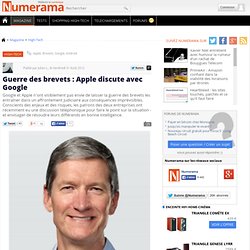
Des actions en justice ont été engagées partout dans le monde, y compris aux États-Unis où le climax de cette lutte sans merci a été atteint la semaine dernière lors du procès-fleuve entre Apple et Samsung. Le verdict a été très lourd, puisque le second a été condamné à verser un milliard de dollars au profit du premier. Mais ce conflit cache un autre rapport de force, qui se déroule cette fois en coulisses.
Samsung wins over Apple in Japan patent case. Samsung finally records a court win over Apple. In matters of patents, Japan is a lot kinder to Samsung than the United States was.
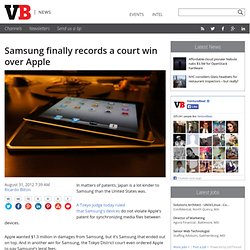
Apple decisively wins Samsung trial: what it means. After two and a half days of deliberations, the Apple vs.
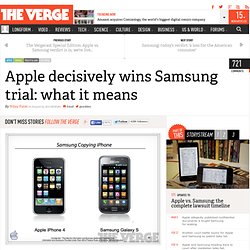
Samsung jury returned a decisive verdict in Apple's favor today — holding that Samsung owes Apple $1.049 billion for copying Apple's intellectual property. Specifically, the jury found that all three of Apple's software patents on the iOS user interface were valid and infringed by a long list of Samsung devices, that Apple design patents were valid and infringed by several Samsung phones, and that Apple's trade dress on the iPhone and iPhone 3G were diluted by several Samsung phones as well.
On the other hand, Samsung lost every part of its case against Apple — the jury ruled that none of the Apple devices in the case infringe Samsung's patents, including patents that are part of the 3G networking standard. The only major decisions that went to Samsung were related to the iPad — the jury didn't think Samsung's tablets copied the iPad's design. After this, the dominoes will begin falling fast. Pourquoi la défaite face à Apple est une bonne nouvelle pour Samsung. Nouvelle édition, entièrement mise en jour en janvier 2014 et augmentée de près de 150 pages !
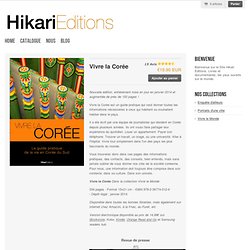
Vivre la Corée est un guide pratique qui veut donner toutes les informations nécessaires à ceux qui habitent ou souhaitent habiter dans le pays. Il a été écrit par une équipe de journalistes qui résident en Corée depuis plusieurs années. Ils ont voulu faire partager leur expérience du quotidien. Louer un appartement. Payer son téléphone. Samsung's 'Design Revolution' started in 1996 with Sony, not Apple. Posted by Hyunhu Jang on August 31, 2012 03:09 am 1996: Samsung's Year of Design Revolution The year is 1996: Apple just purchased NeXT from Steve Jobs and Sony was dominating all aspects of consumer electronics.
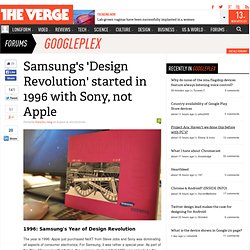
For Samsung, it was rather a special year. As part of the "New Management" initiative, the company declared that 1996 was going to be the "Year of Design Revolution". It was time for Samsung to invest aggressively in design, especially in Korean designers. Samsung's "New Management" initiative was announced in 1993, when Chairman Lee called for a change and set a goal of becoming a first-class company by 2000.
Chairman Lee during the 1997 New Year's Address, said: "...It's an era of individuality and creativity, where imitation can no longer be used" vs.